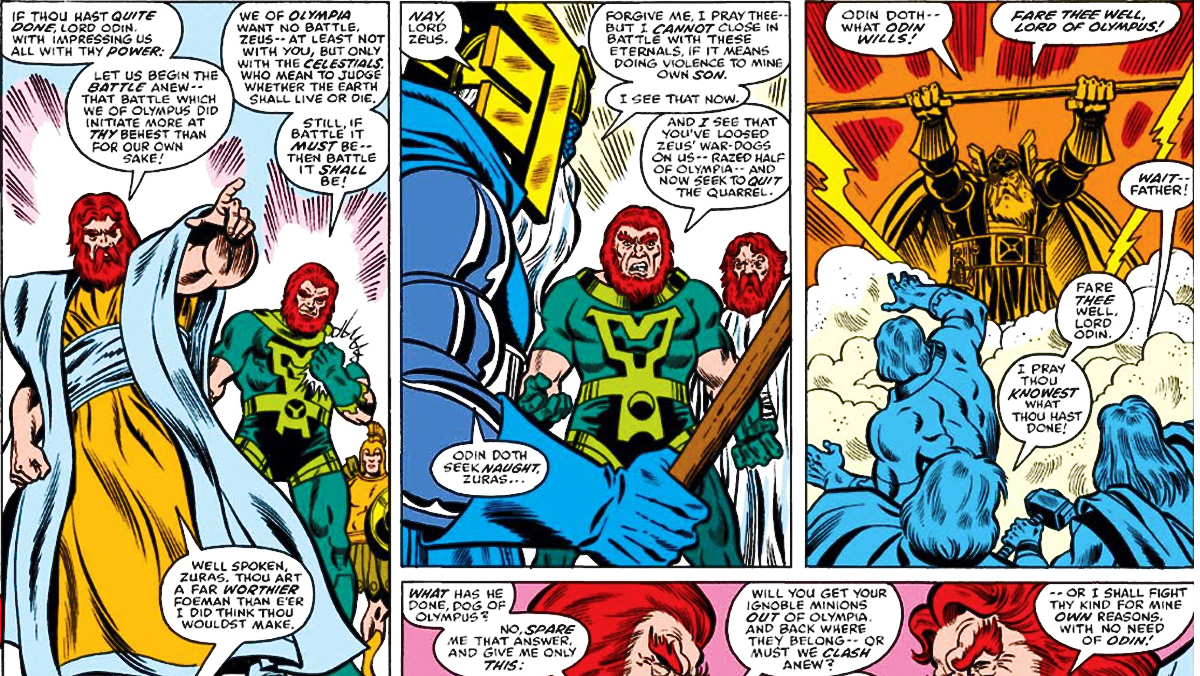In both the Marvel Comics universe and the MCU, they heavily implied that the Eternals inspired the legends behind the Greek Myths. The immortal children of the Celestials like Thena inspired Athena, and so on. However, that presented a bit of a problem. See, the Thor comics long ago established the Greek gods as a powerful pantheon of other-dimensional immortals, just like the Asgardians. Hercules is the most prominent among them. So if the Greek gods were real, how did the Eternals inspire the gods? And as we’ve just seen in the Thor: Love and Thunder teaser, that is most definitely Russell Crowe as Zeus on Mount Olympus. So what gives? Folks, it gets a wee bit convoluted. But there is an explanation.

The Eternals Inspired Earth’s Greek Gods in Jack Kirby’s Marvel Series
The real-world reason behind this Olympian confusion is actually pretty simple. When the great Jack Kirby first created the Eternals in 1976, he conceived the series outside the traditional Marvel universe. But when sales were not that great on the title, the powers that be at the publisher incorporated the characters into the larger Marvel mythos. But that created a problem; Kirby had already introduced the Olympian gods in the pages of Thor a decade prior. So what to do? A little good, old-fashioned retconning was in order. Although it was later creators who did this, and not Kirby himself.
Where Do Marvel’s Olympians Fit In?

In the comics, the Eternal Zuras was the counterpart to Zeus (this character was not in the movie). They explained that Zuras ruled the Eternal city of Olympia, in the mountains of Greece. This was near the main portal between Earth and the Olympians’ home dimension. Supposedly, this caused many ancient Greeks to conflate the Eternals with members of the Olympian pantheon they worshipped. Let’s just say it was an early case of brand confusion.
Zeus and his daughter Athena held a meeting with Zuras, and his daughter Azura. Instantly noticing the strong physical resemblance between Zeus and Zuras and between Azura and herself, Athena suggested that the Olympian gods and the Eternals form an alliance. The Eternals agreed to act as the gods’ representatives on Earth. Azura took the name Thena to solidify this pact. Eventually, humanity believed many of the Eternals were not just the gods’ representatives. They saw them as the gods themselves. This angered the jealous Olympians, leading to a brief war with the Eternals.
A Godly Discrepancy in the MCU

Usually, the MCU likes to streamline some of the more convoluted concepts from the comics for mass consumption. We originally guessed the Eternals’ existence on Earth would simply inspire humans to believe they were gods, and then their names merely changed over time. Certainly, Chloé Zhao’s movie implies that heavily, negating a need for actual Olympians. But now, with Zeus showing up in Love and Thunder, it’s clear the Olympian gods are very real in the MCU. So how will they handle the discrepancy?
The MCU might simply take the same route as the comics, with the Olympians essentially sharing their names with some of the Eternals. The only characters this really applies to are Thena (Athena) and Makkari (Mercury). Circe and Icarus were not technically gods in Greco-Roman mythology, so they wouldn’t necessarily have Olympian counterparts. But Thena in the film certainly never indicated she ever went by another name. Or that her name took inspiration from Athena. Or that Athena was ever even real.

Should They Just Laugh It Off?
This could explain why one of the key Eternals, Zuras, wasn’t in the Eternals movie. With Thor: Love and Thunder introducing the King of the Olympian gods, they probably figured it was all too confusing. So he wound up deleted from the story. Knowing Taika Waititi’s sense of humor, they will probably deal with all this in a humorous way. Maybe Zeus saying something about how those uncreative Celestials stole their whole fabricated backstory for their creations from their own actual history. That seems to be the easiest way to deal with it all. And it’s very in keeping with the MCU brand. So Marvel is going to hand wave it all away with a joke, or do some cosmic gymnastics like the comics to make it all make sense. It remains to be seen which way they go.
The post How Can Eternals and Greek Gods Both Exist in the MCU? appeared first on Nerdist.

0 Commentaires